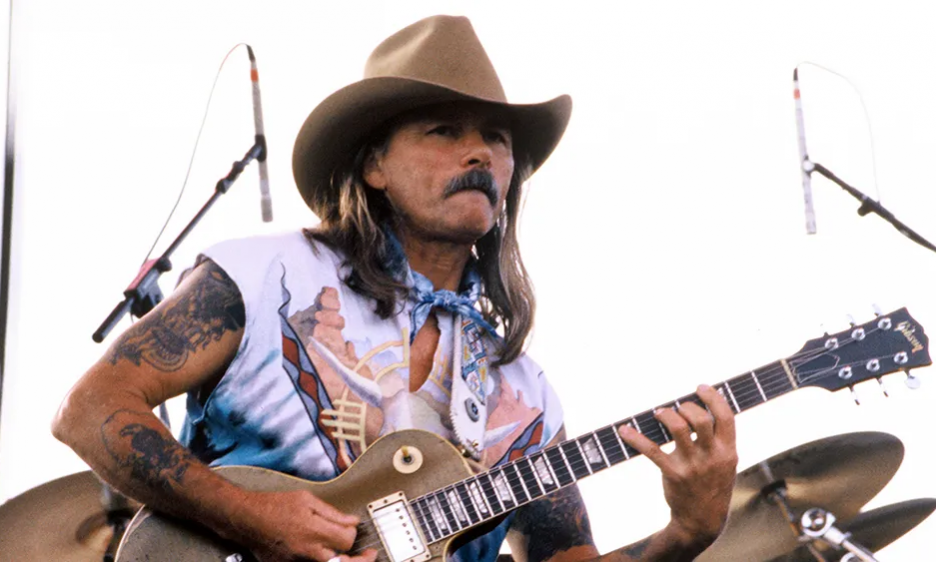Home » Jazz Articles » Profile » Dickey Betts: Another Man Done Gone
Dickey Betts: Another Man Done Gone

Courtesy Getty Images
And it does not take a sorrowful perspective on the man's passing to contemplate how, in a very real sense, Dickey Betts' significant participation in the Allmans came in the face of a rambunctious personality that oftentimes undercut what he had to give. Still, it is wise not to dwell on instances like that of 1993 when he was jailed in Saratoga Springs, New York and had to miss an ABB show (for which his place was taken by Ozzy Osbourne guitarist Zak Wylde).
And while it is not possible to ignore his bitterly disputed ouster from the group in 2000—especially since a reconfigured ensemble continued on for another fourteen years in its wake—it is much preferable to countenance how the late guitarist/vocalist songwriter bolstered the group's work in so many ways. Isolated instances outline the range of style he brought to the group, but hardly do full justice to the man.
For instance, as overt as are the country & western overtones in the Allmans' widespread commercial breakthrough, "Ramblin' Man," much more authentic is the hoedown feel Betts conjured when he took over from his guitar partner on "You Don't Love Me" at the conclusion of the final Fillmore East concert of June 27, 1971 (on the Eat A Peach Deluxe Edition (Mercury, 2006) as well as The 1971 Fillmore East Recordings (UME, 2014)).
Notwithstanding such instances, Dickey Betts was often overshadowed on stage by his original Allmans guitar counterpart, the founder and organizer of the Brothers as we first knew them. But in a string of fundamental acts of humility, neither man ever tried to outplay the other. Strictly within instrumental terms, Betts himself largely deferred to the man known as 'Skydog,' no doubt fully (and rightly) confident in his own abilities to serve the songs and the musicianship of the entire ensemble.
Yet with the fresh perspective that has evolved over time, it has become increasingly clear that Betts' compositions for the Allman Brothers Band were integral for its growth artistically and otherwise. Through originals like "Dreams" and "Whipping Post," Gregg Allman tacitly assumed the role of chief songwriter for the Brothers. Accordingly, no Betts originals appeared on record until the sophomore Allman Brothers LP, Idlewild South (Capricorn, 1970), but it is still fair to say with the benefit of over a half century hindsight, that the opening cut that is "Revival" and even more so the instrumental "In Memory of Elizabeth Reed" set the stage (and the bar high) for the guitarist's future donations to the repertoire.
Still, as one of the focal points of the Allman Brothers breakthrough release, At Fillmore East (Capricorn, 1971), the last was just the first of many similarly striking masterworks Betts composed for the group. While some of its successors were overshadowed for one reason or another at the time of their respective unveilings—hear "Pegasus" on Enlightened Rogues (Capricorn, 1979)—each of those pieces invariably depicted the core improvisational strength of the unit credited with establishing Southern rock as a genre unto itself. There is no denying the majesty inherent in those compositions, transferred directly into the performances, or the unfettered joy he creates with Duane Allman near the finale of his vocal debut "Blue Sky:" over the course of the Allman Brothers Band's entire forty-five year history, it's fair to state Dickey Betts provided more remarkable moments than any other single member(s) of the group.
Those instances of inspiration will always overshadow the darker side of Betts' presence inside and outside the group's inner circles. However many personal demons were at the heart of Betts' conflicts with Gregg Allman in the wake of Skydog's departure from this material world (and the latter had his share too), there is no denying how the eclectic guitarist/songwriter/vocalist rose to the occasion in order to stabilize the surviving Allmans Brothers personnel in 1972-'73. And that's not to overlook how the cull of his tune from Brothers And Sisters (Capricorn, 1973) brought the group its one and only mainstream acclamation (and on the long player coexisted with the euphoric instrumental "Jessica").
And while it is true this expatriate from the Jacksonville, Florida-based group Second Coming—where he was a comrade of now deceased original Allmans Brothers' bassist Berry Oakley—may have poisoned the atmosphere of some later configurations of the band, it is impossible not to heartily praise Dickey Betts' herculean efforts on behalf of the 1989 reunion that proved successful far beyond its short-term ambitions (expectations?) of simply helping promote the comprehensive box set Dreams (Polydor, 1989). Play All Night: Live at the Beacon Theatre 1992 (Epic/Legacy, 2014) captures that lineup at its pinnacle(s).
In the light of such remembrances, it is not hard to let go of less-than-wholly positive recollections of Betts in his later years. But the fact is the mix of bitter and sweet he blended in his guitar playing is the best metaphor for that duality, especially as heard on something like the roiling "Nobody Knows" from Shades Of Two Worlds (Epic, 1991). In the end, it is simply an exercise in frustration to dwell on the downturns in the man's fortune: they are ultimately minor blemishes that pale in comparison to the prolific brilliance that Dickey Betts so often submitted to his collaborators and his audiences prior to his passing in April of 2024.
< Previous
Spring Releases From Jordan VanHemert...
Next >
Solidarity
Comments
Tags
Profile
Dickey Betts
Doug Collette
The Allman Brothers Band
Ozzy Osbourne
Zak Wylde
Gregg Allman
merle haggard
Berry Oakley
warren haynes
Gov't Mule
Tedeschi Trucks Band
For the Love of Jazz
 All About Jazz has been a pillar of jazz since 1995, championing it as an art form and, more importantly, supporting the musicians who create it. Our enduring commitment has made "AAJ" one of the most culturally important websites of its kind, read by hundreds of thousands of fans, musicians and industry figures every month.
All About Jazz has been a pillar of jazz since 1995, championing it as an art form and, more importantly, supporting the musicians who create it. Our enduring commitment has made "AAJ" one of the most culturally important websites of its kind, read by hundreds of thousands of fans, musicians and industry figures every month.
























